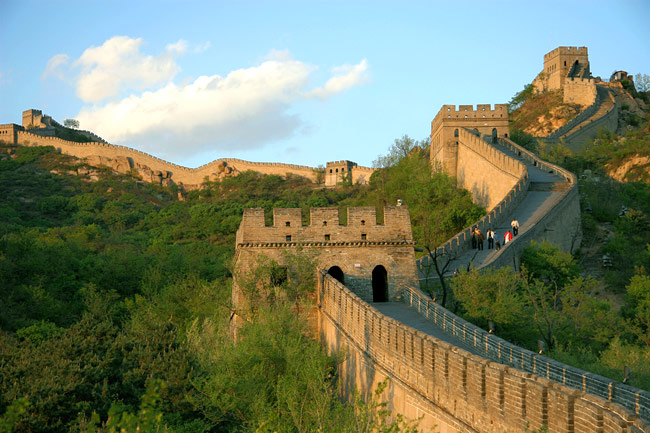
THE GREAT WALL OF CHINA.
THIS famous wall is, next to the pyramids, the oldest piece of man's workmanship on the earth, and was at one time regarded as among the wonders of the world.
The wall extends along the whole northern border of the Chinese Empire, and was built by the first emperor of the Tsin dynasty, to protect the empire against the invasions of the fierce Tartar tribes. It was completed more than two hundred years before Christ, and for some time proved a useful defense against the invaders.
The length of this great barrier is variously given as from twelve to fifteen hundred miles. The average height of the wall is about twenty feet, its thick-ness at the base twenty-five, and at the top, fifteen feet, or broad enough for six horsemen to ride abreast.
On the top of the wall, about one hundred yards apart, are towers, or bastions, which rise some forty-five feet. The body of the wall itself is made of earth enclosed between walls of brick, and during quite a portion of the length, it is said to be little else than a heap of gravel and rubbish.
The building of this immense wall, as may well be imagined, was a long, and difficult undertaking.
The way, which the emperor took to obtain enough workmen for so great an enterprise, seems very cruel. He ordered that every third laboring man throughout the empire should be compelled to enter his service; and they were made to labor like slaves, receiving no pay except a scanty supply of food.
The wall was carried over the tops of the highest hills, descended into the deepest valleys, crossed upon arches over rivers; and in important places it was built double. Our picture gives quite a good idea of how all this was done. One of the most elevated ridges crossed by the wall is five thousand feet above the level of the sea.
As we read about this and other great works of man, and think of the patience, perseverance, and hard toil given to them, this thought naturally comes to mind: If we would but bestow the same strength of purpose and labor in putting away our bad habits, what pure, strong, and enduring characters we might develop!
E. B.